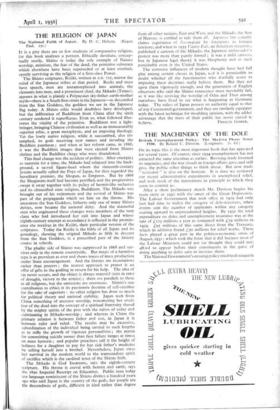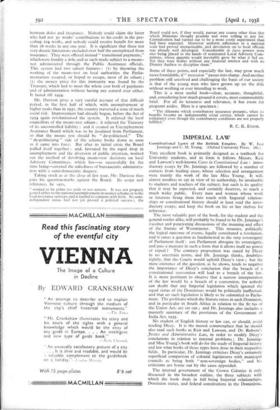THE MACHINERY OF THE DOLE
British Unemployment Policy: The Mod.?.rn Phase Since 1930. By Ronald C. Davison. (Longmans. 7s. 6d.)
ON its topic this is the most important book that has appeared for several years. Of course, since 1934 unemployment has not attracted the same attention as earlier. Reviving trade lessened its urgencies, and the war clouds in foreign affairs gave, and still give, the public other things to think about. But now trade " recession " is also on the horizon. It is time we reviewed our recent administrative experiments in unemployed relief, and took stock of the innovations in principle to which they seem to commit us.
After a short preliminary sketch Mr. Davison begins his main story in 193o with the onset of the Great Depression. The Labour Government that took office in 1929 had only just had time to widen the category of dole-receivers, when events sent the number of applicants within any category soaring upward to unprecedented heights. By 1931 the total expenditure on doles and unemployment insurance was at the rate of £125 millions a year as compared with £59 millions in 1929. £95 millions of this came direct from the Treasury, which in addition found £30 millions for relief works. These facts played a great part in the politico-economic crisis of August, 193t ; which took the form that it did because most of the Labour Ministers could not (or thought they could not) afford to appear before their constituents in the guise of doing anything to doles save to increase them.
The National Government's ensuing policy tried to distinguish
between doles and insurance. Nobody could claim the latter who had not 3o weeks' contributions to his credit in the pre-
ceding 104 weeks, and nobody could receive benefit for more than 26 weeks in any one year. It is significant that these not very drastic limitations excluded over half the unemployed from insurance. They were offered instead " transitional payments," which were frankly a dole, and as such made subject to a means- test administered through the Public Assistance officials. This system had two salient features : (r) by throwing the working of the means-test on local authorities the Parlia- mentarians escaped, or hoped to escape, most of its odium ; (2) the money price for this immunity was found by the Treasury, which had to meet the whole cost both of payments
and of administration without having any control over either. It lasted till 1934.
Mr. Davison gives a very careful account of that difficult period, in the first half of which, with unemployment at higher peaks than in 1931, the country traversed a zone of much social risk. Improvement had already begun, before the Act of 1934 again revolutionised the system. It relieved the local councillors of the means-test odium ; it relieved the Treasury of its uncontrolled liability ; and it created an Unemployment Assistance Board which was to be insulated from Parliament, so .that the means test should be " de-politicised." The " de-politicising " side of the scheme broke down as soon as it came into force. But after its initial crisis the Board pulled itself together ; and, favoured by the rapid drop in unemployment and the diversion of public attention, worked out the method of devolving means-test decisions on local Advisory Committees, which has—so successfully for the time being—covered the nakedness of bureaucratic administra- tion with a semi-democratic drapery.
Taking stock as at the close of last year, Mr. Davison thus puts his question-marks against the Board. Its scope and reference, he says, " seemed to be either too wide or too narrow. It was not properly geared either to the national unemployment insurance scheme or to the local assistance services, and it tended to compete with both. Its semi- independent status had not yet proved a political success ; the
Board could not, if they would, pursue any course other than that which Ministers thought prudent and were willing to pay for. Centralisation had turned out to be a more costly experiment than had been • expected: Moreover uniform adherence to a national scale had proved impracticable, and devolution on to local officials was already well developed. Considerable de facto powers were also being placed in the hands of nominated Local Advisory Com- mittees, whose appetite would inevitably grow by what it fed on. Yet they were bodies without any financial interest and with no District Auditor to discipline them."
Some of these points, and especially the last, may grow much more formidable, if " recession " passes into slump. And another problem still unsolved and challenging the basis of our society is that of the young men who have grown up on the dole without working or ever intending to work.
This is a most useful book—clear, accurate, thoughtful, and, considering how much ground it covers, most commendably brief. For all its terseness and relevance, it has room for pregnant asides. Here is a specimen :
" The dilemma which contributory insurance presents, when its benefits become an indispensable social service, which cannot be withdrawn even though the contributory conditions are not properly fulfilled."
R. C. K. ENSOR.















































 Previous page
Previous page